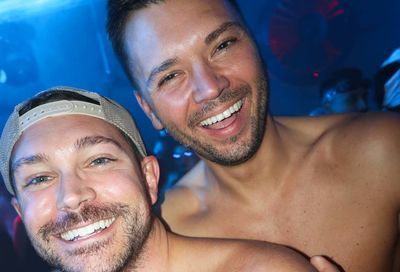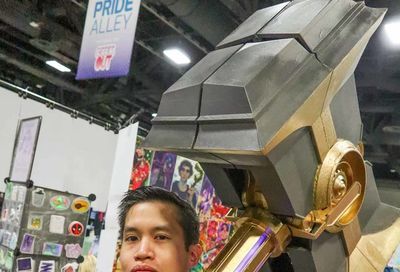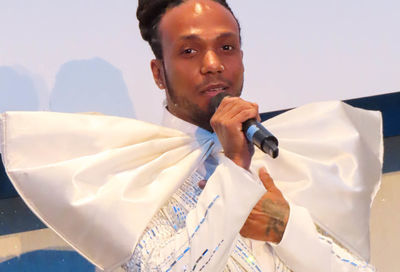NYC Pride will reduce police presence and bar officers from marching in the parade
Decision stems from discomfort that some community members have with police participation in Pride-related events.

Organizers of NYC Pride events have announced plans to ban police and other law enforcement officers from marching in the city’s annual Pride parade until at least 2025, and will reduce police presence by keeping on-duty officers at least a block away from any Pride-related events.
In a press release, NYC Pride said it was seeking to create safer spaces for the LGBTQIA+ community and communities of color at a time when police violence against marginalized groups, including Black, Latino, and trans communities, is front of mind.
“The sense of safety that law enforcement is meant to provide can instead be threatening, and at times dangerous, to those in our community who are most often targeted with excessive force and/or without reason,” the organization said in the press release. “NYC Pride is unwilling to contribute in any way to creating an atmosphere of fear or harm for members of the community. The steps being taken by the organization challenge law enforcement to acknowledge their harm and to correct course moving forward, in hopes of making an impactful change.”
The ban on uniformed officers or officer-affiliated groups lasts until 2025, at which point their participation will be reviewed by NYC Pride’s Community Relations and Diversity, Accessibility, and Inclusion Committees, as well as the organization’s executive board. In the meantime, organizers will increase the event’s security budget to hire community-based security and additional first responders while reducing police presence.
Police will provide first response and security “only when absolutely necessary as mandated by city officials,” according to NYC Pride, with the hope that organizers will be able to keep on-duty officers at least one city block away from the event perimeter where possible.
See Also: Capital Pride unveils a host of colorful, vibrant June events
“NYPD is not required to lead first response and security at NYC Pride events,” the organization said in the press release. “All aspects of first response and security that can be reallocated to trained private security, community leaders, and volunteers will be reviewed. An increased budget for security and first response will allow NYC Pride to independently build a first response emergency plan using private security and provide safety volunteers with de-escalation training for first response when necessary.”
Going forward, the organization will not mention, spotlight, interview, or feature law enforcement on its social media channels, in its digital content, Pride Guide, or any other media, and officers will not be allowed to speak in an official capacity at events or use any NYC Pride platform. Volunteers, media, and third-party vendors will be expected to abide by the ban until the organization reassesses whether police participation would be possible in 2025.
NYC Pride does not currently mention, spotlight, interview, or otherwise promote law enforcement across its social media channels, digital content, Pride Guide, or any other Pride-related media. As such, NYC Pride will not allow NYPD to speak at its events or use any NYC Pride platform to market the department or tout its work. All changes related to police and NYPD participation will be communicated to volunteers, media, and third-party vendors to ensure enforcement beyond the 2020-2021 Pride season.
Instead, NYC Pride will highlight a diverse group of speakers and presenters, particularly those who are Black or people of color, as well as organizations that serve those communities. NYC Pride has also committed to increasing Black-led, Black-centered partnerships and establishing long-term vendor relationships with minority-owned businesses.
NYC Pride Co-Chair André Thomas thanked the Anti-Violence Project, David Johns, the executive director of the National Black Justice Coalition, Anita Dolce Vita, owner and editor-in-chief of DappyQ, Shijuade Kadreee, founder of Compass Strategies Consulting, and Devin Norelle, a model, advocate, and writer, for providing guidance in crafting the new policy.
The Pride parade and street fair are currently scheduled for the weekend of Sunday, June 27, marking some of the first in-person Pride events since last year, when celebrations were held virtually due to the COVID-19 pandemic.

NYC Pride’s decision appears to be inspired by the recent controversies over racial injustice and police brutality that rose to the surface following the death of George Floyd at the hands of police in Minneapolis last year. That, coupled with lingering resentment from activists who believe police presence is inappropriate at an event that commemorates the police raid on the Stonewall Inn, a gay bar, in 1969.
In 2019, there were two alternative marches held in Manhattan in protest of the commercialization of Pride. One of those, the Queer Liberation March, fashioned themselves as a protest, arguing that the heavy presence of police at Pride was problematic.
The Gay Officers Action League said in a news release it was disheartened by the decision, according to NBC News.
The group called the ban an “abrupt about-face” and said the decision “to placate some of the activists in our community is shameful.”
The New York Daily News criticized the ban in an editorial, saying it was “shameful” that “people ironically discriminated against — with a shameful history of being sidelined from other parades — see no irony in kicking a group to the curb just because of their jobs.” The editorial board also noted how much things have changed from a quarter-century ago, when gay NYPD officers sued the department and won the right to proudly march in their uniforms in the Pride parade to now, when officers are being asked to deny part of their identity, lest they offend people who are “triggered” by the presence of police.
“Maybe the parade’s organizers should read their own mission statement, proclaiming that ‘we respect, value, and celebrate the unique attributes, characteristics and perspectives that make each person who they are,'” the Daily News editorial board wrote. “Or would organizers prefer that gay, lesbian and transgender cops participate in the parade, but in plainclothes, hiding who they really are? That’s called closeting.”
Still other activists say NYC Pride’s actions don’t go far enough, with the Reclaim Pride Coalition, which organizes the annual Queer Liberation March, calling the move “too little, too late.” The annual event, slated to be held at 3 p.m. on Sunday, June 27, is intended to provide an alternative to the main Pride parade.
See also: YouTube and The Trevor Project will co-host two global livestream events for Pride month
The Reclaim Pride Coalition has previously said that the presence of corporate sponsors, politicians, and police at the parade and other events whitewash or deny the historical roots of Pride, which started as a protest movement intended to call attention to the problems facing the LGBTQIA2s+ community and marginalized populations.
The coalition noted that police have previously attacked protesters during Black Lives Matter demonstrations and have a history of using force against activists, including those who participated in “NYC Shut It Down” protests criticizing the overly corporate-tinged and heavily-policed Pride parade. Its leaders also criticized NYC Pride’s plans to hire “private security,” on the grounds that many “private security” staffers are former or current off-duty police officers.
“Last year’s Queer Liberation March was attacked by NYPD using pepper spray and batons, and in the past month, the NYPD has attacked and violently arrested queer and trans BIPOC organizers of the weekly Stonewall Protests, twice,” the coalition said in a press release. “RPC organizers also pointed out that the ingrained kowtowing to corporate interests in the HOP parade continues to be of concern, posting a simple message across their social media platforms: ‘Do corporations next.'”
Detective Sophia Mason, a spokesperson for the New York City Police Department, told NBC News that the department’s “annual work to ensure a safe, enjoyable Pride season has been increasingly embraced by its participants.”
“The idea of officers being excluded is disheartening and runs counter to our shared values of inclusion and tolerance,” Mason added. “That said, we’ll still be there to ensure traffic safety and good order during this huge, complex event.”
Read more:
Mormon professor apologizes after calling gay student an anti-Christ
Queer people stage public protest in Iran after gay man beheaded by family
Tennessee students can sue if they see a trans person using a restroom
Support Metro Weekly’s Journalism
These are challenging times for news organizations. And yet it’s crucial we stay active and provide vital resources and information to both our local readers and the world. So won’t you please take a moment and consider supporting Metro Weekly with a membership? For as little as $5 a month, you can help ensure Metro Weekly magazine and MetroWeekly.com remain free, viable resources as we provide the best, most diverse, culturally-resonant LGBTQ coverage in both the D.C. region and around the world. Memberships come with exclusive perks and discounts, your own personal digital delivery of each week’s magazine (and an archive), access to our Member's Lounge when it launches this fall, and exclusive members-only items like Metro Weekly Membership Mugs and Tote Bags! Check out all our membership levels here and please join us today!




























You must be logged in to post a comment.